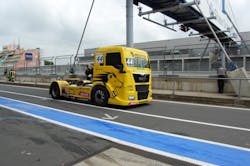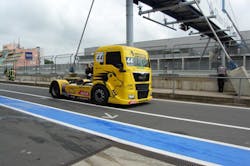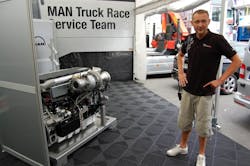Can truck racing ever catch on in the U.S.? Well I hope it sure can, if it can even remotely imitate the European experience with the sport.
Now let me state this firmly from the outset: truck racing terrifies the ‘you-know-what’ out of me. Much like my experience with stock cars a few years back, my time in a truck racing vehicle at Germany's famed Nurburgring track – driven expertly by Ellen Lohr I’ll have you know – scared me half to death. And not in the least because her 5.5 ton racing truck cranking out around 1,100 horsepower made me feel like I was strapped into a jet fighter airplane instead of a ground-bound vehicle.
Still, there’s something to be said for a sport that puts a premium on driver skill – not in the least because none of Europe’s racing trucks are forbidden by rule to use electronically controlled braking systems of any sort and that drivers really only need to shift between two gears due to the massive kinetic force their relatively lightweight vehicles produce.
I mean, these trucks need to slalom down grand prix style raceways at over 100 mph – and let me tell you, from personal experience, their high center of gravity makes such speeds positively scary on courses lined with all sorts of twisty turns.Yet the camaraderie of truck racers away from the race course itself is in many ways reflects the “old school” ethic of the “knights of the road” here in the U.S, with European truck racing teams more than willing to help each other out in a pinch even though they compete on most weekends between March and October for a variety of prizes.
And this is not all for the sake of burning diesel for the fun of it either (though in this case the fuel used by Europe’s truck racers is biodiesel). No, many European trucking OEMs – especially engine makers –sponsor truck racing teams because the sport offers them a way to test their products in extreme conditions.Indeed, Artur Klein (at left) – who serves as racing team manager for the engine research division of Europe’s MAN Truck & Bus AG – told me that three weekends of truck racing will reproduce roughly three to four years worth of commercial truck life, in no small part due to the higher horsepower (2.5 times greater than what’s normally generated by on-highway engines) during extreme acceleration and deceleration maneuvers.
He even said that MAN made design changes to its production-line engine based on what MAN’s engineers observed on the truck racing course – changes that made its on-highway engines more robust and helped them last longer than before.
If that alone isn’t a vote of confidence in the practical value of truck racing, I don’t know what is.


